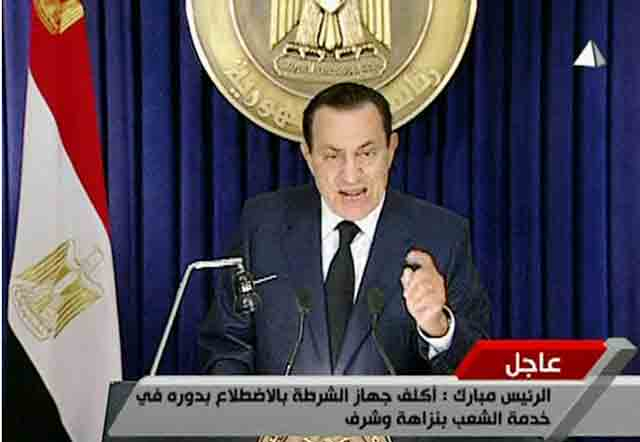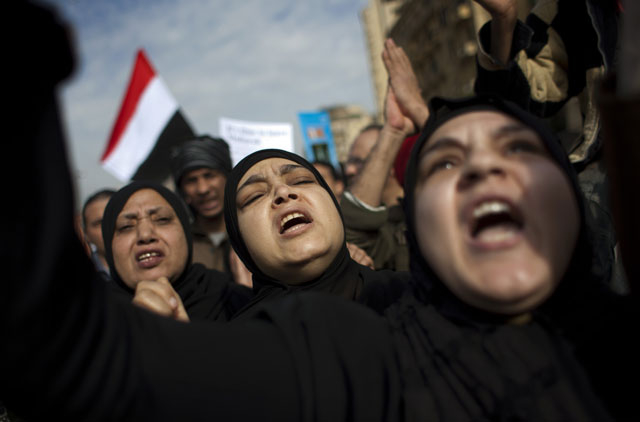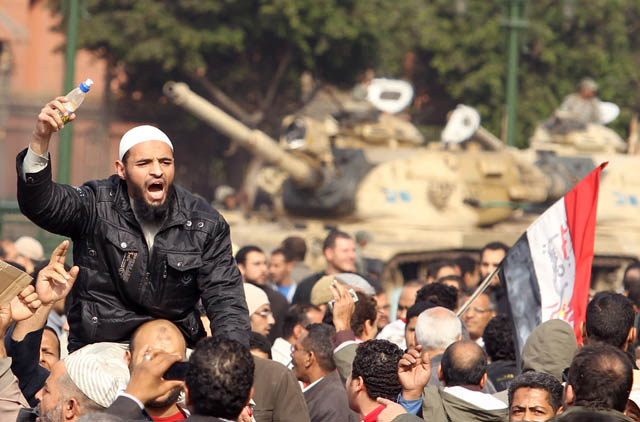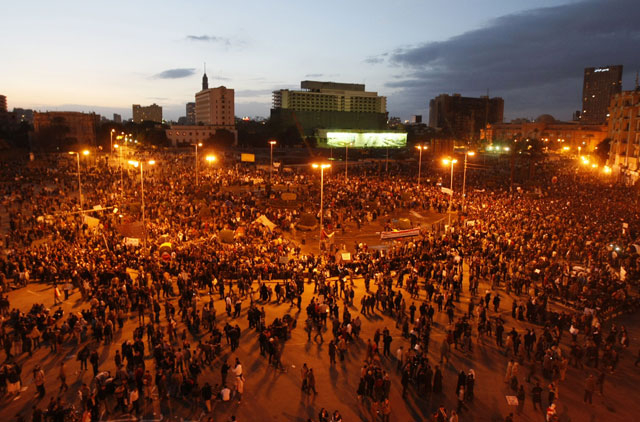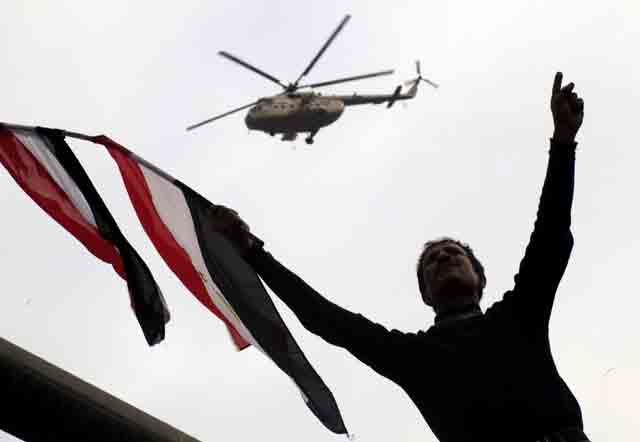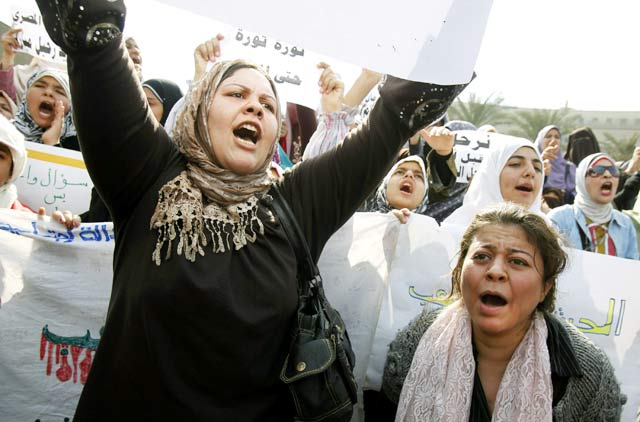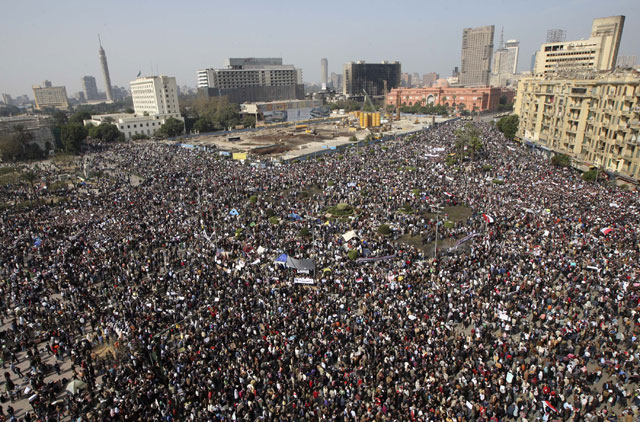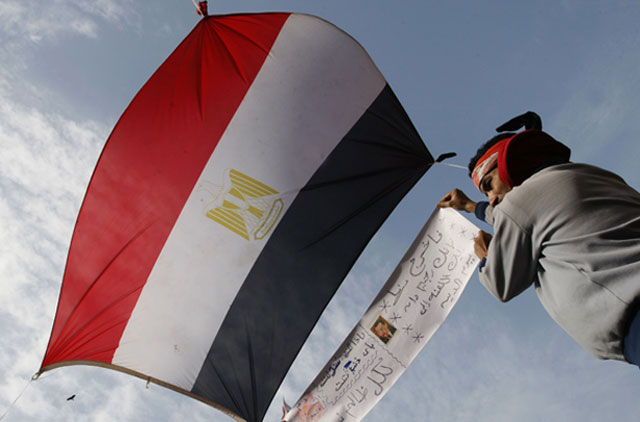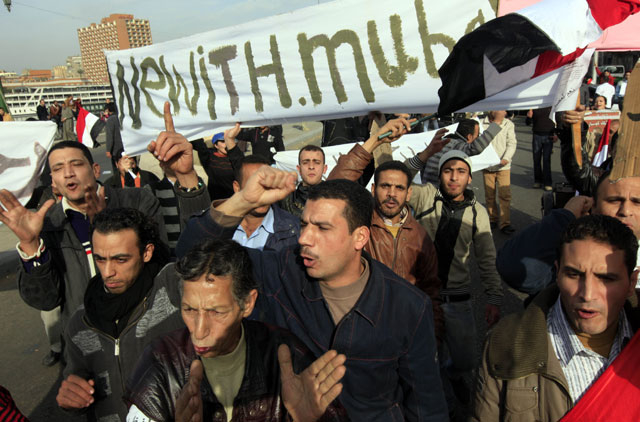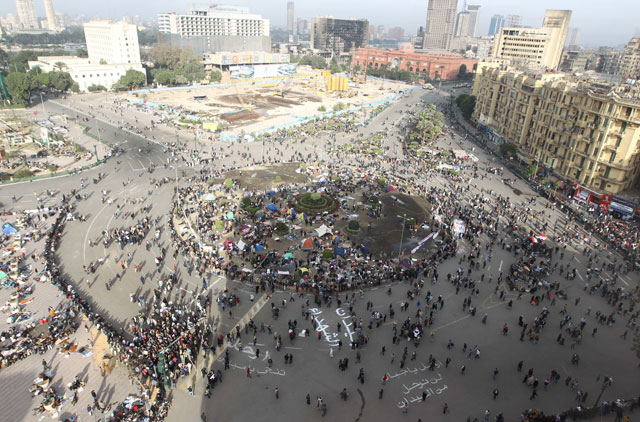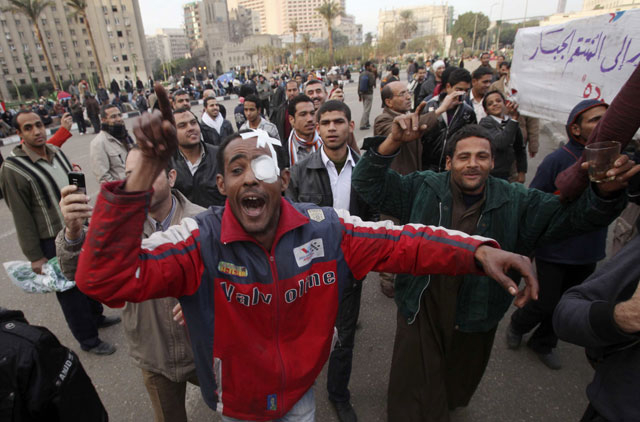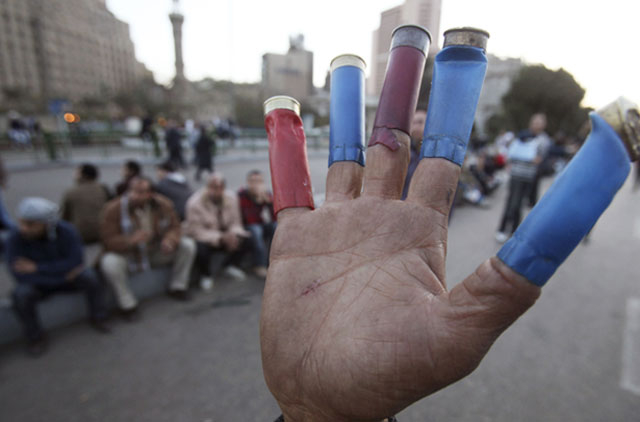Cairo: Egyptian President Hosni Mubarak, under pressure from millions of protesters who for days called for his resignation, finally said on Tuesday night he will step down later this year.
The embattled president, who ruled Egypt for more than 30 years, said in an address on state TV he will not run for a sixth term and step down after a new leader elected in "free and democratic" election in September, which he said is part of political reforms to be introduced in the near future.
"These times are difficult and testing" he said, adding that political parties have "unfortunately" rejected his offer to open a national dialogue. "My duty now is to provide a stable atmosphere for a peaceful transition of power," he added.
He said he will oversee the constitutional changes that would allow free and democratic elections. "I will, in the few remaining months of my current term, make sure the newly appointed government implement the legitimate demands of the people...including eradicating the official corruption"
The declaration came hours after Mubarak met with a US special envoy.
Frank G. Wisner, a veteran diplomat, delivered a specific message from President Barack Obama that Mubarak must pledge publicly he will not run again for the presidency, the New York Times said quoting diplomats in Cairo and Washington.
The message "appears to take the administration beyond the delicately balanced calls it has already issued for an "orderly transition" to a more politically open Egypt," the US daily said.
Mubarak's statement was made at the end of a dramatic day in Egypt which saw millions of people marching in central Cairo and major cities demanding that he step down.
Media reports also suggested that Amr Moussa, Secretary-General of the Arab League, 74, is possible successor to Mubarak.
US President Obama has told the embattled president of Egypt Hosni Mubarak that he should pledge publicly not to run for another term this fall, says a report.
President Hosni Mubarak will say in a speech that he will step down at the next election but would stay in office till then to meet demands of protesters in that period, Al Arabiya TV said on Tuesday.
It sourced the news to unnamed reports.
It said the president would make the comments in a speech later on Tuesday.
The next presidential election is scheduled for September.
Until now, officials had indicated Mubarak, 82, would likely run for a sixth six-year term of office.
Egypt's President Hosni Mubarak will give a speech on Tuesday after at least 1 million people rallied across the country clamouring for him to step down, Al Arabiya television said. There was no official confirmation.
The channel also said Vice-President Omar Sulaiman had started meetings with representatives of parties.
It said Sulaiman's office had been in contact with groups of protesters in Cairo's Tahrir square, the focal point for the demonstrations. It did not give a source.
Egyptian dissident and former UN nuclear watchdog chief Mohammad Al Baradei has discussed with US and British diplomats possible "post-Mubarak" scenarios, an Egyptian political source told AFP on Tuesday.
Al Baradei held telephone discussions with US ambassador to Egypt Margaret Scobey and British ambassador Dominic Asquith, the source told AFP on condition of anonymity.
Gulf News reporter Abbas Al Lawati talks to Radio1/Radio 2
Washington confirmed that Scobey spoke to the former globe-trotting diplomat for the first time since he flew back to Egypt as public unrest and demonstrations mounted against the 30-year strongman rule of President Hosni Mubarak.
Al Baradei proposed that newly-appointed vice-president and former intelligence chief Omar Sulaiman take over as interim president during which time parliament could be dissolved and the constitution amended ahead of general elections, the source said.
Another option proposed by Al Baradei was to form a presidential council of three people - a military man and two civilians - to manage the transition period once Mubarak has stepped down.
Abbas Al Lawati writes: A projector and a giant makeshift screen have been set up on one corner of Tahrir Sq. The screen is being held up between two light poles. Someone announced on a megaphone that the screen will be showing Al Jazeera soon and the people started cheering. Thousands of people started clapping and whistling as Al Jazeera came on the screen. Most in front of the screen are sitting now. This doesn’t seem to be live TV. Is probably a recording.
It’s not Al Jazeera. Just a video montage of events during the unrest, most of which is from Al Jazeera. People keep clapping as images of police brutality are repeated on the screen
Abbas Al Lawati writes: The volunteer guards here are working tirelessly to maintain order, specially to protect the army and the museum. I just spoke to one who said he has been standing in one place for 3 hours. He looked very tired and people kept offering him food and water, which he would politely reject. He said there’s no real organisation or coordination. Whoever wants can do it. He’ll move when another volunteer, someone he has probably never met, will step in and tell him to take a rest.
One man stands alone in the corner holding a piece of cardboard with a handdrawn picture of a plane. One poster reads: O Suzzanne aren’t you worried about him?
The city has switched off many street lights in Tahrir Square. I wonder how the helicopters circling above can assess the situation.
Egypt's armed forces chief of staff Sami Enan could be an acceptable successor to Hosni Mubarak because he is perceived as incorruptible, a member of the banned Muslim Brotherhood said on Tuesday.
Kamel Al Helbawi, a prominent overseas cleric from Egypt's main opposition movement, told Reuters that Enan, who has good ties with Washington, was a liberal who could be seen as suitable by an opposition coalition taking shape on the streets of Egypt.
"He can be the future man of Egypt," Helbawi said in a telephone interview.
"I think he will be acceptable ... because he has enjoyed some good reputation. He is not involved in corruption. The people do not know him (as corrupt)."
Helbawi said Enan was not an Islamist but "a good, liberal man".
Little is known internationally about Enan, believed to be in his early 60s, other than he appears to have spent much of his career in air defence.
A profile on Silobreaker, the news and information monitoring service, gives his date and place of birth as 1948, in Cairo, and says he was trained in both Russia and France as well at a military academy in Egypt.
He held senior roles in air defence before being appointed to his current job in 2005, the website indicates.
US orders non-essential personnel to leave Egypt
The State Department on Tuesday ordered non-essential US government personnel and their families to leave Egypt amid growing anti-government protests and uncertainty over the security situation.
It said it had taken the step "in light of recent events."
The move is an indication of Washington's deepening concern about developments in Egypt and replaces the department's initial decision last week to allow non-essential workers who wanted to leave the country to do so at government expense. In a statement, the department said it would continue to evacuate private US citizens from the country aboard government-chartered planes.
On Monday, the US evacuated more than 1,200 Americans from Cairo on such flights and said it expected to fly out roughly 1,400 more in the coming days. Monday's flights ferried Americans from Cairo to Larnaca, Cyprus" Athens, Greece" and Istanbul, Turkey. On Tuesday, the department expects to add Frankfurt, Germany as a destination.
It also hopes to arrange evacuation flights from the Egyptian cities of Aswan and Luxor.
The Cairo airport is open and operating but the department warned that flights may be disrupted due to protests against the Egyptian government.
More than a million gather in and around Cairo's Tahrir square, as Muslim Brotherhood said they would not negotiate with President Hosni Mubarak’s government.
Arab League Secretary-General Amr Mousa said he is willing to assume any role of leadership if asked by fellow Egyptians.
Protesters speak
Mubarak's newly appointed vice-president, intelligence chief Omar Sulaiman, began talks with opposition figures on Monday and promised reforms. The army also promised to hold its fire and declared the protesters demands legitimate.
But protesters in Cairo's Tahrir Square, who kept vigil through the night in defiance of a curfew, vowed to continue their campaign.
The UN human rights chief, Navi Pillay, says she had unconfirmed reports that up to 300 people may have been killed and more than 3,000 injured in Egypt's unrest and called for calm during the day's protests which could be a "pivotal moment".
Live from Cairo
Gulf News Reporter Abbas Al Lawati is in Tahrir Square with the demonstrators. Abbas reports:
4:30pm: Opposition figure Abdul Jalil Mustafa, who is close to Mohammad Al Baradei, tells the BBC World Service's Newshour programme that the opposition still had to "hear the details" of the offer for dialogue, but it would not be accepted until President Mubarak resigns. The Muslim Brotherhood rejects negotiations with Mubarak.
CNN's Ben Wedeman in Tahrir Square tweets: Protester in #Tahrir square says 'Mubarak may have thick skin but we have sharper nails'
The BBC's Wyre Davies is at what he calls a massive demonstration in the northern port city of Alexandria. He says there are thousands of Muslims, Christians and people who support various different factions at the rally, but that they all have one common demand - that Hosni Mubarak step down. There have been minor skirmishes with pro-Mubarak groups, who have tried to confiscate journalists' recording equipment, but the president's supporters are vastly outnumbered by opposition protesters.
4:20pm: Areas where the protest is held have turned into open air markets, with vendors selling their goods. Cigarettes, nuts and tissues mostly. People are laughing and singing. They seem confident that the regime’s days are over.
4pm: There is a counter protest of about 300 people supporting the regime. They are protected by the army. Meanwhile in Tahrir square young men have climbed on top of poles and hung gigantic posters calling for the regime's end.
People are giving out flyers asking protesters to keep their morale high and carry on protesting until the government falls.It asks protesters to "Have faith in God. God will guide them through this.”
I spoke to a woman in her 50’s earlier carrying around her one-day-old grandson Yousuf. She is illiterate and says she roams the streets selling vegetables. Her primary concern is the cost of living and lack of jobs. She says she "wants the regime gone.”
Others said they were passive citizens before but after witnessing the bravery of the protesters in Tahrir Square they’ve decided to join. One man says, ‘I’ll be coming here everyday until the government falls.’”
The army seems to be playing a much more neutral role today. No interaction whatsoever with the people. No smiling, no chatting. They are not accepting food or allowing protesters to stand on top of tanks. They’ve even painted over some of the anti-government slogans that were sprayed onto the tanks.
Loud chanting against the Mubarak regime can be heard in the background.
Approximately 30,000 people in Tahrir Square calling for Mubarak to go. Special forces have arrived wearing protective gear. Protesters have formed two very tight human chains in front of them. They say there are plain clothes government loyalists among the protesters who are looking to provoke a confrontation between the anti-government protesters and the army.
For the first time the army has taken control of access routes to the square that was previously patrolled by volunteers. They are checking ID’s and bags for explosives and weapons. Those wearing loose clothing ar also patted down.
The volunteers are still checking too. My bag was checked once by the army and three times by the volunteers. Entry and exist points are very narrow and slow moving. Any kind of panic can cause a stampede. Army is filming protesters with cameras. I asked why? The soldier said its for the army. Another soldier said it was for Egyptian TV. That’s strange because there are a lot of journalists in here already. Why the need to outsource filming to the army?
A BBC correspondent at Cairo airport says the authorities there are confiscating all broadcasting equipment from foreign journalists arriving in Egypt.
Movement of traffic through the Suez Canal was unaffected by ongoing protests across Egypt on Tuesday, the Canal Authority said.
Our Egyptian correspondent Ramadan Al Sherbini is on his way to Tahrir Square and is still available on mobile networks.
A possible explanation for this is that authorities have jammed the signal of those gathering in Tahrir square specifically, where the protesters are congregating.
The Egyptian Minister of Information told CNN on Tuesday that cellular networks in Egypt will be closed during the next few hours, before the scheduled mass protest.
According to the Egyptian Ministry of Information, “Noor", an internet service Provider Company in Egypt, stopped all the services as a move to blackout internet in full. The government has stopped the telecommunications networks operating in the country, according to the ministry.
President Hosni Mubarak has ordered to stop the trains for an indefinite period, as to prevent the demonstrators from reaching the Tahrir Square on Tuesday.
Al Arabiya TV reports that the ruling NDP party will hold a pro-Mubarak rally Tuesday in Ismailiya (125km east of Cairo)
According to Al Jazeera, fifty Egyptian human rights groups have signed an appeal calling on Mubarak to step down to save "avoid a blood bath".
An Egyptian TV guest on Al Jazeera Arabic said that not all Egyptians agree with the protesters, ” I want to tell the president, we are sorry, forgive us, and may God protect you for us.”
Google Inc has launched a special service to allow people in Egypt to send Twitter messages by dialing a phone number and leaving a voicemail, as Internet access remains cut off in the country amid anti-government protests.
Protesters defy curfew
Many protesters defied a curfew to bunker down overnight in Tahrir square, epicentre of the protests which have forced Mubarak to announce political and economic reforms dismissed as inadequate by opposition figures.
As Mubarak announced a new cabinet and the newly appointed vice president Omar Sulaiman offered talks with the opposition, protesters pushed ahead with a singular goal of forcing the president from office.
They announced an indefinite general strike and called for a "march of a million" in the capital on Tuesday, the eighth day of an uprising that has claimed at least 125 lives in clashes between demonstrators and police.
Another million-strong march was planned in the Mediterranean port city of Alexandria, as national train services were cancelled in an apparent bid to stymie protests.
The new demonstrations will come as the hated police have returned to the street after a mysterious two-day absence that protesters said was a ploy to sow a sense of insecurity.
But while it remains unknown what posture police will adopt in the face of the strike and marches, the army stated clearly that it would not confront the demonstrators.
"To the great people of Egypt, your armed forces, acknowledging the legitimate rights of the people," stress that "they have not and will not use force against the Egyptian people," the military said in a statement.
Tens of thousands of protesters had carpeted Cairo's Tahrir Square, the epicentre of demands for an end to the corruption, deprivation and police oppression.
Eid Mohammad, an organiser of the protests, told AFP: "It was decided overnight that there will be a million-man march on Tuesday. We have also decided to begin an open-ended general strike."
Faced with the biggest protests of his presidency, an increasingly embattled Mubarak has appointed his first-ever vice president and a new prime minister in a desperate attempt to hold on to power.
A new cabinet unveiled on Monday did little to placate the protesters. However, the departure of interior minister Habib Al Adly, whose notorious security forces have been accused of systematic human rights violations, was welcomed.
"We will accept no change other than Mubarak's departure," said one protester who asked not to be named.
Another, Rifat Ressat, said: "We want a complete change of government, with a civilian authority."
Police were ordered back onto the nation's streets on Monday, after an absence during which the army was deployed in the face of the revolt, but few policemen were visible on Cairo's streets.
Their vanishing act remains unexplained officially, but it left the city prey to looters and jail-breakers, and residents formed self-defence groups to protect their patches.
As the anti-regime campaign continued apace, Vice President Omar Sulaiman said Mubarak had tasked him "with opening immediate talks with the political forces to begin a dialogue around all the issues concerning constitutional and legislative reforms."
Meanwhile, Arab League chief Amr Mousa, a former Egyptian foreign minister often tipped as a possible successor to Mubarak, called for a peaceful transition.
"There has to be a peaceful way forward, a peaceful transition...from an era to the other," Mousa told AFP.
"It is incumbent upon politicians or people working in politics to help that process."
Protesters massed in downtown Cairo vowed that Mubarak's resignation would not be enough, while Egypt's main opposition group, the Muslim Brotherhood, called for them to press on until they bring down his creaking regime.
Amid chaos and lawlessness, several foreign governments said they would evacuate their nationals, and the United States authorised the departure of embassy families.
Washington, a key ally of Egypt, has urged Mubarak to do more to defuse the crisis, with President Barack Obama calling for "an orderly transition to a government that is responsive to the aspirations of the Egyptian people."
With input from agencies


